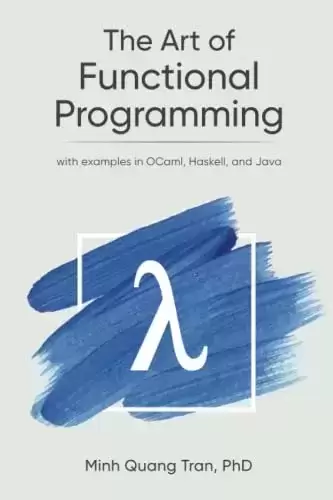
Book Description
Welcome to The Art of Functional Programming book!
Functional programming is a powerful and elegant programming paradigm. Initially only popular among university researchers, it’s gained much traction in the software industry in the last few years. From big companies to start-ups, engineers and managers have realized that functional programming excels at abstraction and composition. Functional programming allows for highly concise solutions with increased safety. This has led to rising demand for software engineers with functional programming skills. This book will help you move your programming skills to the next level.
There are tons of programming languages, frameworks, and tools out there – with many more coming in the future. The only way to stay ahead of the game in this vast and quickly changing software industry is to master the fundamentals and principles that cut across programming languages, frameworks, and tools. In the case of functional programming, learning to adopt the functional way of solving problems is much more productive than memorizing how to write functional code in a particular language. This book teaches this functional way of thinking. We’ll also learn many fundamental techniques from programming languages, such as parsing, compilation, and type checking.
We’ll also look at examples and exercises that are typically encountered in a programmer’s day-to-day job. Furthermore, an entire chapter is dedicated to applying what we’ve learned to real-world scenarios. In particular, we’ll use functional programming to process collections of data for an e-commerce application and handle the JSON datatype.
Here is the summary of the chapters in this book:
* In Chapter 1: Introduction, we’ll start the book with an introduction to functional programming. In particular, we’ll see how it can overcome some of the inherent weaknesses of the imperative programming paradigm. We’ll also discuss why functional programming matters to any software engineer.
* In Chapter 2: Expressions — The Building Blocks of Functional Programs, we examine expressions and how to build complex expressions from simpler ones. Three aspects of expressions – syntax, types, and semantics- will be covered. Along the way, we’ll gain a much deeper understanding of how programming languages work, including parsing, type checking, interpretation, and compilation.
* In Chapter 3: Building Abstractions with Functions, we’ll get to know lambda calculus—a mathematical model serving as the foundation of all functional programming languages. We’ll learn how to capture computation patterns as functions. Finally, we’ll discuss various techniques for working with functions such as currying, recursion, and higher-order functions.
* In Chapter 4: Complex Data Types, we’ll focus on the complex data types typically found in functional programming languages, such as tuples and lists. Furthermore, we’ll use algebraic data types to represent hierarchical data, and pattern matching to extract data from complex data types.
* In Chapter 5: Common Computation Patterns, we’ll dive into some of the most common computation patterns, such as map, filter, fold, and zip. These functions capture highly general computation patterns on lists and other data structures that can be reused to formulate many other functions.
* In Chapter 6: Dataflow Programming with Functions, we’ll go over dataflow programming, a programming paradigm that emphasizes composing programs from existing components. We’ll learn how functional programming allows us to do dataflow programming elegantly and reap all its benefits.
* In Chapter 7: Applying Functional Programming to Various Domains, we’ll apply what we’ve learned to process collections of data commonly found in mobile and web applications and backend services. Furthermore, we’ll use functional programming to represent and handle JSON.
中文:
书名:函数式编程的艺术
欢迎来到函数式编程艺术大全!
函数式编程是一种功能强大而优雅的编程范式。最初只在大学研究人员中流行,但在过去几年中,它在软件行业获得了很大的吸引力。从大公司到初创企业,工程师和管理人员已经意识到,函数式编程擅长抽象和组合。功能编程允许高度简洁的解决方案,并提高安全性。这导致对具有函数式编程技能的软件工程师的需求不断增长。这本书将帮助你将你的编程技能提升到一个新的水平。
那里有大量的编程语言、框架和工具-未来还会有更多的编程语言、框架和工具。在这个庞大且瞬息万变的软件行业中,保持领先地位的唯一方法是掌握贯穿编程语言,框架和工具的基础知识和原理。在函数式编程的情况下,学习采用函数式的方式来解决问题要比记忆如何用特定语言编写函数式代码更有成效。这本书教授了这种功能性的思维方式。我们还将从编程语言中学习许多基本技术,例如解析,编译和类型检查。
我们还将查看程序员日常工作中通常遇到的示例和练习。此外,整整一章致力于将我们学到的知识应用于现实世界的场景。特别是,我们将使用函数式编程来处理电子商务应用程序的数据集合,并处理JSON数据类型。
以下是本书各章的摘要:
* 在第1章: 简介中,我们将从函数编程的介绍开始。特别是,我们将看到它如何克服命令式编程范例的一些固有弱点。我们还将讨论为什么函数式编程对任何软件工程师都很重要。
* 在第2章: 表达式-功能程序的构建块中,我们研究了表达式以及如何从更简单的表达式中构建复杂的表达式。将涵盖表达式的三个方面-语法,类型和语义。在此过程中,我们将对编程语言的工作方式有更深入的了解,包括解析,类型检查,解释和编译。
* 在第3章: 用函数构建抽象中,我们将了解lambda演算-一种数学模型,它是所有函数式编程语言的基础。我们将学习如何捕获计算模式作为函数。最后,我们将讨论用于处理函数的各种技术,例如currying,递归和高阶函数。
* 在第4章: 复杂数据类型中,我们将重点介绍通常在函数式编程语言 (例如元组和列表) 中找到的复杂数据类型。此外,我们将使用代数数据类型来表示分层数据,并使用模式匹配来从复杂数据类型中提取数据。
* 在第5章: 常见计算模式中,我们将深入研究一些最常见的计算模式,例如map,filter,fold和zip。这些函数捕获列表和其他数据结构上的高度通用的计算模式,这些模式可以重用以制定许多其他函数。
* 在第6章: 带函数的数据流编程中,我们将讨论数据流编程,这是一种强调从现有组件组成程序的编程范例。我们将学习函数式编程如何使我们能够优雅地进行数据流编程并获得其所有好处。
* 在第7章: 将函数编程应用于各个领域中,我们将应用所学知识来处理移动和web应用程序以及后端服务中常见的数据集合。此外,我们将使用函数式编程来表示和处理JSON。
评论前必须登录!
注册